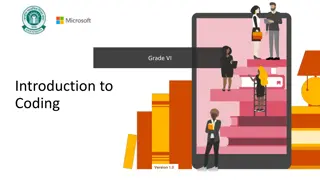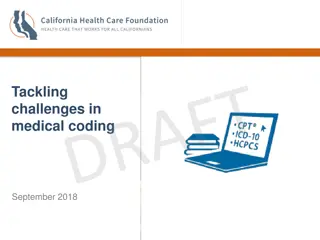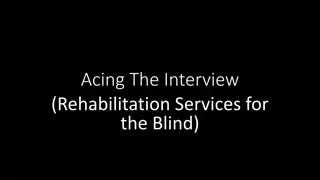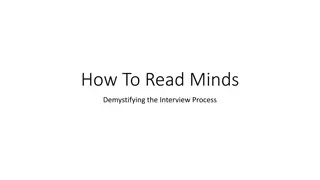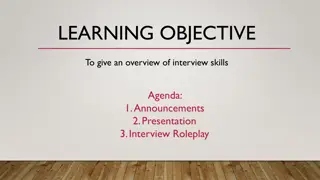Interview Coding: Analyzing Common Themes and Quotations
Discover the process of coding in qualitative research interviews to identify common themes and assemble relevant quotations. Explore recommended codes, coding examples, and insightful quotes from speakers discussing commercial products in the context of medical use. Understand the significance of capturing various viewpoints and utilizing codes across different themes.
Download Presentation

Please find below an Image/Link to download the presentation.
The content on the website is provided AS IS for your information and personal use only. It may not be sold, licensed, or shared on other websites without obtaining consent from the author. Download presentation by click this link. If you encounter any issues during the download, it is possible that the publisher has removed the file from their server.
E N D
Presentation Transcript
3.1 Interview Coding
We have our interviews, now what? Goals: Look for common themes between interviews Assemble quotations that illustrate these common themes Photo by Amy Hirschi on Unsplash How do we do this? Coding!
What is Coding? Qualitative research/interview term NOT about computer programming It s about assigning code words to interview quotes and drawing out themes in the interviews
Recommended Codes medical need surgery testing neurotransmitter drugs electricity peer pressure your choice! Photo by Sabri Tuzcu on Unsplash
Coding Example -RET program tDCS interviews I interviewed 4 other teachers + program director Codes arranged in order of frequency (most frequent at the top)
Code Commercial Product Speaker 1: Yeah you can just buy it off the shelf without a prescription and it has all these benefits. I'm thinking about how the brain changes over time and what might be useful now. May not be useful, later on. Like, how do we measure effectiveness of the device overtime? Speaker 2: This is kind of shocking. And so can you just buy this right now. Yeah, that seems a little crazy to me that they're selling these medical devices.
Quotes for Code Commercial Product Speaker 3: If I'm just me myself as a patient suffering from depression and I go to Costco and buy it, the answer is no. Speaker 4: If I were using it for personal use like say I needed some stimulation to help learn the language. If it was commercially available, I might try it. Speaker 5: I think yes if it was a medical use, and it was, you know, recommended by a doctor and under their care, and I had a need for a solution, then yes, but the whole just like I ordered on Amazon, because it does stimulate the brain, there's something special about the brain, it just feels. I feel uneasy about it.
Why is this an interesting code? 1. All 5 speakers had something to say about it 2. There were some similarities and some differences in viewpoint Want to capture a range of viewpoints Assemble a range of quotes 3. Themes are made up of multiple codes. You can use this code in different ways. For example, it fits in multiple themes: societal impacts accessibility enhancement vs. medical need
Putting it Together: example 4. I am choosing the theme: enhancement vs. medical need There seemed to be wariness among the participants about this device being commercially available without a prescription or doctor s supervision. One was shocked that this device was just available off the shelf. Two of them would not use something you could just buy from Amazon or Costco. Only one expressed willingness to use it for a non-medical enhancement reason.
Putting it Together Other codes that might work with this theme: FDA approval prescription doctor curiosity early adopter tech-savvy The best codes will come out of your reading of your own interviews Share your codes with the others in your group
Putting it Together This analysis can start to tell us why people are more willing to use a drug for enhancement than a device, or where the reservations about using a device are coming from.
Next steps -coding using Excel 1. Exchange interviews and read one other interview in your group 2. Copy your interview transcript into an Excel spreadsheet. 3. Give each quotation or sentence its own cell 4. Highlight the important part of the quote and write your code in the cell next to it.
Next steps -deciding on a theme 5. When everyone is finished coding their interview, discuss and decide as a group on which theme you would like to talk about in your presentation. 6. It can be one of the three that I suggested or your own idea. Recommended Themes: brain stimulation side effects societal impacts
Next steps -finding quotes 7. Go through your interview and choose codes that are relevant to your theme 8. Exit Ticket: everyone will code their own interview in class. In research groups there may be multiple researchers coding a single interview, or more often, one researcher will code many interviews
Prepare Presentation 1. Choose a different speaker from your group than last time 2. Presentation contains the following elements, and take 10 mins or less 1-sentence summary of how the technology works A combined/summary narrative. How does an average high school senior studying neuroscience at our school react to this technology? A theme that stood out in the 3 interviews Two or three representative quotations from the interviews illustrating that theme. Are there any issues your group is still wondering about? Any follow-up questions you wish you had asked?




